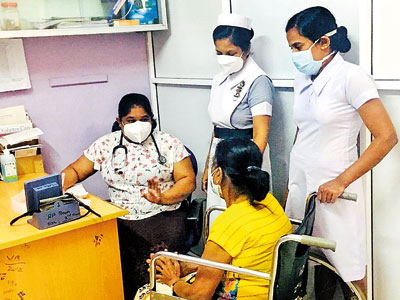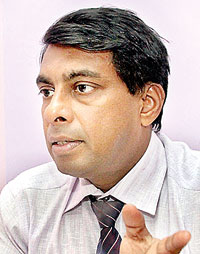News
Valuable advice on how to handle Long COVID
Of 63 healthcare workers ranging from doctors to minor staff at the National Eye Hospital, Colombo, who had got COVID-19, 50% (around 31) had some lingering ailment.
This is what an ongoing survey by Consultant Physician Dr. Waruna Gunathilake attached to the National Eye Hospital has found, with some being aware of how to deal with it but others not. Dr. Gunathilake says that if the body’s reaction to the original infection persists beyond 4 weeks, then we need to consider it as Long COVID.

The clinic in progress
“These symptoms can last up to one year and studies across the world have shown the incidence of Long COVID to be 10-30% (if 100 have got the infection then Long COVID may affect any number from 10 to 30) from among the infected population,” he says, explaining that in addition to the common symptoms there could also be a myriad others including numbness of the body and pain in the rectum.
Dr. Gunathilake says that the high-risk group for Long COVID seems to be people who are obese; those who had asthma previously; smokers; and people who have had more than five symptoms in the original infection. Interestingly, people who don’t show symptoms of COVID-19 or have not got positive results through RT-PCR or rapid antigen testing (RAT) can also get Long COVID. However, Long COVID is non-infectious.
How should you manage Long COVID?
- Shortness of breath – breathing exercises are important.
- Cough – whether productive (with phlegm or mucus) or non-productive (dry cough), steam inhalation helps.
- Loss of the senses of taste and smell – it is important to regain these senses, as otherwise there is an impact on the appetite. Appetite and food intake have a direct bearing on increasing/improving a person’s defences against infection.
Keep smelling perfume, cinnamon or peppermint to regain the sense of smell.
To activate the taste buds, put a slice of lime into the mouth and suck on it.
- Insomnia – Avoid caffeinated or malted drinks, reduce screen (phone and computer) time during the day and have a set time to go to bed. A little exercise before sleeping may also help.
- Mental fog – There may be an inability to concentrate and make rational decisions. There could also be patchy memory loss. A housewife peeling an onion may forget to cut it up and put it into the saucepan. To deal with this, the person should get out of social isolation, maintain good hydration and have a good night’s sleep.

Dr. Waruna Gunathilake
Dr. Gunathilake recommends that the authorities should consider the different disabilities brought upon by Long COVID in the work life of people. Bosses should look at it closely, taking into consideration what impacts it has occupation-wise, whether working online or going into office physically.
Citing the example of an air traffic controller who is finding it difficult to do his full work shift, he says that in such cases there should be flexible hours or cover-up shifts. Intermittent breaks should also be permitted. If the employee has a doctor’s certificate, he/she should be given appropriate leave.
He points out that long-term online work has also compelled people to “work all the time”, especially in the private sector, with bosses fixing meetings in the night in usually off-duty hours. This is online abuse and the authorities may need to look at regulating this sector in the new normal.
Another aspect that Dr. Gunathilake talks of is how the private health sector is exploiting people’s vulnerabilities and fears. Many people are undergoing social isolation, stress and emotional breakdowns. Do we really need a full body medical checkup? The private health sector is exploiting the current situation and offering post COVID health packages at a cost of around Rs. 10,000. These are unnecessary and meant to make a quick buck.
“If anyone is feeling under the weather after recovering from COVID-19, he/she should see a doctor and get advice whether any tests are needed and if so what tests, without an all-test blanket at high cost. Some may need a few tests but others psychological counselling,” he advises.
He adds: “The future in the new normal is to strengthen Sri Lanka’s time-tested primary healthcare system which covers all aspects of public health. The primary healthcare system, with an emphasis on prevention rather than cure, has worked very well. It is a role model for many other countries. Earlier, its main focus was communicable diseases (CDs), now Sri Lanka should also cover non-communicable diseases (NCDs) effectively. The need is to find out the lapses, deficiencies and shortcomings in the primary healthcare system and remedy them.”
Walk-in clinic at Eye Hospital for staff and patients, maybe extended to outsiders soon
A walk-in clinic from 8 a.m. to 4 p.m. from Monday to Friday is being conducted in the Resident Physician’s office on the 2nd floor of the National Eye Hospital not only for the hospital staff but also for patients who seek OPD services or are in wards.
“We are looking at setting up a helpline to allow people to book an appointment, so that we can extend this clinic’s services to outsiders,” said Dr. Waruna Gunathilake.
Manned by two medical officers and a nursing officer, the clinic gives advice on the specific needs of a patient including coping strategies, whether medical or non-medical interventions are needed and also conducts required tests.

